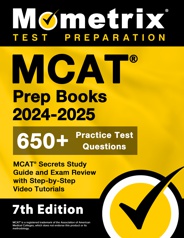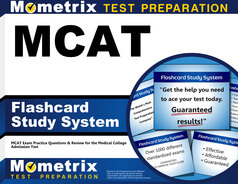Click “Start Test” above to take a free MCAT practice test, and check out our premium-quality MCAT test prep resources by clicking the links below!
MCAT Practice Tests by Subject
If you need some extra practice in a specific area, click one of the subjects below to get started on a topic-specific MCAT practice test.
MCAT Exam Contents
There are four sections on the MCAT. The first three sections contain 59 questions, while the fourth section contains only 53.
- Biological and Biochemical Foundations of Living Systems: These questions are devoted to assessing your understanding of the basic processes that foster life.
- Chemical and Physical Foundations of Biological Systems: These questions assess your knowledge and understanding of basic physical and biological science.
- Psychological, Social, and Biological Foundations of Behavior: These questions assess your understanding of behavioral and sociocultural determinants and how they affect health outcomes
- Critical Analysis and Reasoning Skills: These questions are rooted in the social sciences and humanities.
All of the questions on the MCAT are multiple-choice and are either passage-based questions or discrete questions.
Discreet questions are not relevant to a specific passage you read.
MCAT Outline
Check out Mometrix's MCAT Study Guide
Get practice questions, video tutorials, and detailed study lessons
Get Your Study Guide
Study Tips
How to Study Effectively
Your success on MCAT test day depends not only on how many hours you put into preparing but also on whether you prepared the right way. It’s good to check along the way to see whether your studying is paying off. One of the most effective ways to do this is by taking MCAT practice tests to evaluate your progress. Practice tests are useful because they show exactly where you need to improve. Every time you take a free MCAT practice test, pay special attention to these three groups of questions:
- The questions you got wrong
- The ones you had to guess on, even if you guessed right
- The ones you found difficult or slow to work through
This will show you exactly what your weak areas are and where you need to devote more study time. Ask yourself why each of these questions gave you trouble. Was it because you didn’t understand the material? Was it because you didn’t remember the vocabulary? Do you need more repetitions on this type of question to build speed and confidence? Dig into those questions and figure out how you can strengthen your weak areas as you go back to review the material.
Answer Explanations
Additionally, many MCAT practice tests have a section explaining the answer choices. It can be tempting to read the explanation and think that you now have a good understanding of the concept. However, an explanation likely only covers part of the question’s broader context. Even if the explanation makes sense, go back and investigate every concept related to the question until you’re positive you have a thorough understanding.
Comprehend Each Topic
As you go along, keep in mind that the MCAT practice test is just that: practice. Memorizing these questions and answers will not be very helpful on the actual test because it is unlikely to have any of the same exact questions. If you only know the right answers to the sample questions, you won’t be prepared for the real thing. Study the concepts until you understand them fully, and then you’ll be able to answer any question that shows up on the test.
Strategy for MCAT Practice
When you’re ready to start taking practice tests, follow this strategy:
- Remove Limitations. Take the first test with no time constraints and with your notes and MCAT study guide handy. Take your time and focus on applying the strategies you’ve learned.
- Time Yourself. Take the second practice test “open book” as well, but set a timer and practice pacing yourself to finish in time.
- Simulate Test Day. Take any other practice tests as if it were test day. Set a timer and put away your study materials. Sit at a table or desk in a quiet room, imagine yourself at the testing center, and answer questions as quickly and accurately as possible.
- Keep Practicing. Keep taking practice tests on a regular basis until you run out of practice tests or it’s time for the actual test. Your mind will be ready for the schedule and stress of test day, and you’ll be able to focus on recalling the material you’ve learned.
Check out Mometrix's MCAT Flashcards
Get complex subjects broken down into easily understandable concepts
Get Your Flashcards
How to Study
Think you aren’t a good test-taker? Maybe on a study-time crunch? Or just don’t know how to begin studying? Mometrix has designed a new Study Secrets course to help every student, no matter what study scenario you are in. Here’s what you’ll find in the Study Secrets Course:
- Techniques to Conquer Procrastination
- Steps to building a Study Plan custom to your learning style
- 7 Effective Note-Taking Methods
- Test-Taking Tips
- Memory Techniques and Mnemonics
- And much more!
Everyone learns differently, so we’ve tailored our Study Secrets Course to ensure every learner has what they need to prepare for their upcoming exam or semester. Click below to check it out!
MCAT Test Prep Materials
To help you prepare for the MCAT, you should work with a comprehensive study guide and flashcard set. The materials provided by Mometrix include a thorough review of the core concepts and vocabulary you will need to be familiar with. They also provide insightful tips for making educated guesses on questions you don’t know by using certain context clues and hints in the phrasing of the question and its possible answers.
FAQs
Q
How much does the MCAT cost to take?
A
The registration fee for the test is $345.
The Association of American Medical Colleges (AAMC) does offer financial assistance for candidates who can provide proof that the fee is too much of a financial burden.
Q
What is a passing score?
A
The MCAT does not technically have a passing score, but most test-takers get a score of 504 or above.
Q
How long is the MCAT?
A
In total, you are given 7 hours and 33 minutes for the entire test, which includes multiple breaks.
Q
How many questions are on the MCAT?
A
There are 230 questions on the MCAT.
*MCAT is a registered trademark of the Association of American Medical Colleges, which does not endorse Mometrix Academy or our methodology.


